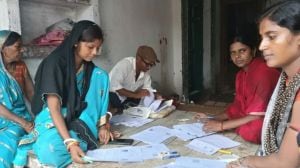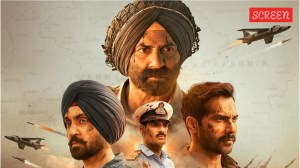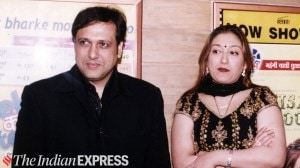Click here to follow Screen Digital on YouTube and stay updated with the latest from the world of cinema.
Changing Realities
Khamosh Pani director Sabiha Sumars second feature film shows glimpses of the contradictions in modern Pakistan.
In Pakistani filmmaker Sabiha Sumars Good Morning Karachi,we meet Rafina,a strong-willed woman who wants to establish herself as a model in the evolving Pakistani fashion industry. Undeterred by all the objections and criticism around her,Rafina (Aamna Illyas) does not lose sight of her objective,despite personal strife. This film is about the youth realising their dreams and it is a very real portrayal of the changes in Pakistani society at present. Its a coming-of-age-story about the young men and women in the country, says the Karachi-based filmmaker. Good Morning Karachi premiered in India at the just concluded 15th Mumbai Film Festival. This is Sumars second feature film after Khamosh Pani (2003) starring Kirron Kher,which won the Locarno International Film Festivals award for Best Film and Best Female Actor.
After a world premiere at the Raindance Film festival in London this year,Good Morning Karachi will travel to the 3rd San Francisco International film festival in November with a theatrical release in Europe after the Berlin Film Festival. In her 85-minute feature film,one catches a glimpse of a young and vibrant Pakistan where youngsters want to overcome societys norms. While the protagonist represents a voice of modernity,the other character Arif (Yasir Aqueel),dreams of a better Pakistan through political action. Rafinas story is the story of people living in Karachi who try to reconcile to the demands of tradition and modernity in their evolving society. When private media mushroomed overnight in Pakistan,it brought out people from the woodwork. Young people such as Rafina are a product of the economic demand that wanted youngsters to come and run these channels, says Sumar,who shot this film primarily in Karachis Akhtar colony,a predominantly lower middle-class suburb.
The film in inspired by a novella,titled Rafina,written by Shandana Minhas but Sumar adapted the story and set it in 2010 in Karachi,referencing the characters against the backdrop of the return of politician Benazir Bhutto to Pakistan and a time when the political landscape was undergoing a change in the country. We took some creative liberties to separate from the book. Beyond the political turmoil I wanted a story,which was between the haves and have nots who form the vernacular educated of our country. The opportunities are so few for the people who have studied in the vernacular medium, explains Sumar,who co-wrote the script in 2008 and shot it over a period of five years,with a foreign crew. Funds were difficult to come by. So we had the British Broadcasting Corporation (BBC) on board along with few private financers. So it took time for us to get the look and feel that we wanted from it, she adds.
Most of the actors in the film are first timers. Illyas,who plays the protagonist is an aspiring model,and had never faced the camera,while Aqueel is a voice-over artiste in Pakistan. I wanted to cast people whose emotions were real,so that they could live their characters on screen rather than act it out, says Sumar. Like Khamosh Pani,almost all of Sumars works have centred around women issues,such as Who Will Cast the First Stone (1988),on the religious ordinances issued during General Zia-ul-Haqs regime. My stories tend to have a lot of women because I have worked with women writers. Moreover being a woman,these are issues that I can relate to, she explains.
Sumar says that this is a good time for filmmakers in Pakistan as the funding avenues have opened up. The country paid a price for putting down the arts. And now we see the opening up of Pakistani cinema. There will always be high-budget and low-budget films. But financing has only just started, she says.
- 01
- 02
- 03
- 04
- 05

































